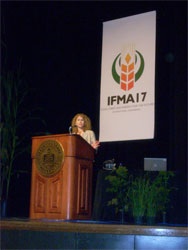 In the wake of headlined disease outbreaks in livestock, such as the H1N1 virus and Avian flu among several others, Dr. Ann Wilkinson, associate director of Global Alliances for Pfizer Animal Health in Christchurch, New Zealand, spoke at Wednesday morning’s session of the International Farm Management Association Congress on issues relating to advancements in animal health and food safety.
In the wake of headlined disease outbreaks in livestock, such as the H1N1 virus and Avian flu among several others, Dr. Ann Wilkinson, associate director of Global Alliances for Pfizer Animal Health in Christchurch, New Zealand, spoke at Wednesday morning’s session of the International Farm Management Association Congress on issues relating to advancements in animal health and food safety.
In her presentation, Dr. Wilkinson outlined several hot topics in the current livestock industry. With the occurrence of many transboundary diseases over the past several years, there are many human health issues closely related to livestock production. While an intense amount of scientific research goes into the development of new products and use of drugs such as vaccines, antibiotics and hormones, consumers tend to create their own perceptions of these developments and practices- regardless of the benefits and scientific logic backing such discoveries. These misconceptions have had a significant impact on the livestock sector, which accounts for 40 percent of agriculture’s Gross Domestic Product.
Dr. Wilkinson explained Pfizer, which is an animal pharmaceutical company with operations in 60 countries, has shifted their primary focus to disease prevention. “Prevention, prevention, prevention,” Dr. Wilkinson emphasized. Prevention is less costly and easier to implement in an operation as opposed to treating an entire herd. Over the years, less emphasis has been made towards antibiotic use and more focus has been given to prevention methods, including vaccination. Vaccinations have evolved rapidly over the years.
With the introduction of genetic engineering, the use and effectiveness of vaccinations have been taken to a new level. Dr. Wilkinson described several different kinds of vaccines. A vaccine to prevent transboundary diseases, such as hoof and mouth disease, called DIVA has been developed. Genetically modified vaccines can help to optimize growth and production. Delivery is another important part of administering vaccines. When one thinks of a vaccine, the tradition thought that comes to mind is of a needle and syringe. However, Dr. Wilkinson described several different methods for vaccination such as implantable vaccine pellets and slow or pulse release vaccines, both of which administer the vaccine over an extended period of time.
While this innovative technology may be good news for producers, consumers are likely to perceive them in a different light. The technology to create high-producing animals is available, but how acceptable is it? And where will this technology take us? While many pharmaceuticals have been proven to improve food quality, consumers are still anxious about buying products that have been genetically modified.
Dr. Wilkinson cites a cause of this problem may be due to the lack of people involved in agriculture. With an increasingly complex environment in animal health interventions, there is an increasing demand for independent agricultural researchers outside of the major companies to eliminate bias. Decreased funding and increased ethical concerns do not make animal health an attractive field to go in to at the present time, but Dr. Wilkinson cites a projected 50 percent increase in demand for protein in the near future that will require more high-quality livestock production. This will result in a demand for more educated employees in the livestock sector. “So encourage your children to go vet school,” Dr. Wilkinson urges her audience. “The more people we can involve in agriculture, the better off the industry will be.”
Dr. Wilkinson was raised on a sheep farm in New Zealand. She received her veterinarian degree from Massey University in Australia in 1987 and her MBA from Cornell University in New York in 1997. She has spent seven years in private practice in Australia and one year in New York. At Cornell, Ann was an ambulatory dairy clinician. She has also completed the Michigan State University three-year Dairy Health Management Certificate Program. In her ten years at Pfizer, Dr. Wilkinson has served roles in Strategic Account Management and Veterinary Operations for the Dairy Group in addition to her current role as associate director of Global Alliances.


